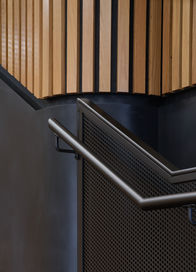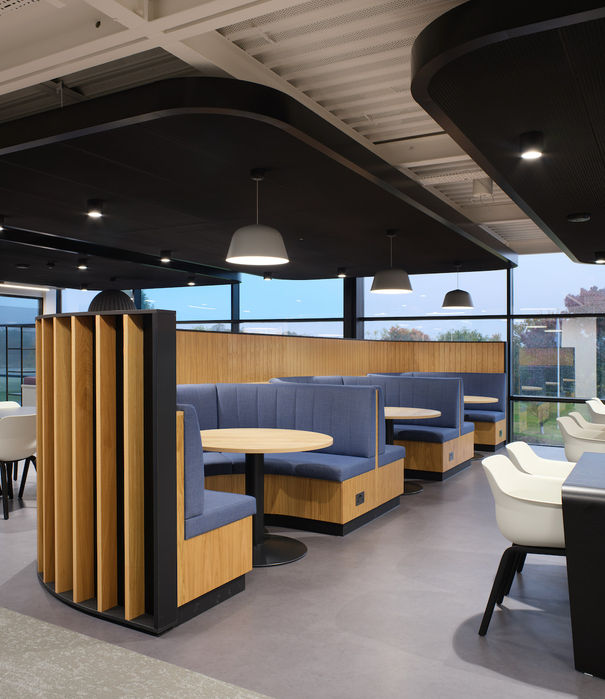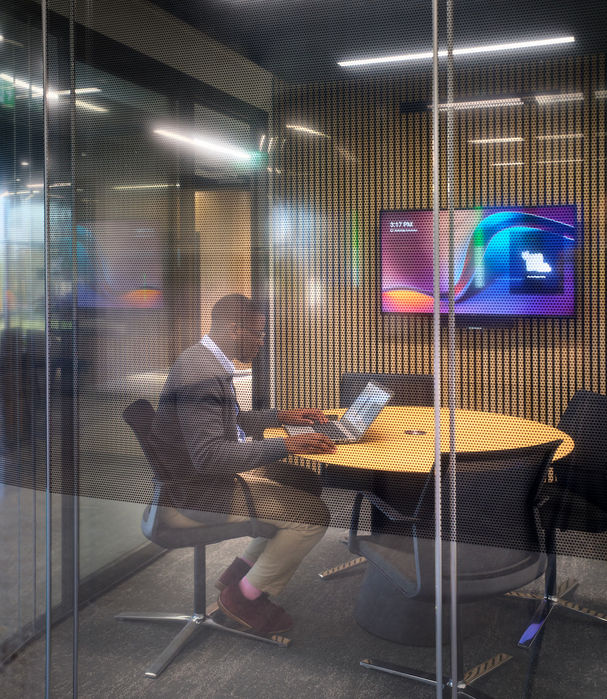The GITC is the heart of PA’s international network of creative studios, research labs and engineering centres. The visitor experience is of upmost importance to the centre and at the core of GTA’s project brief.
PA Consulting is an innovation and transformation consultancy who believe in the power of ingenuity to build a positive human future. From medical devices to manufacturing equipment, from consumer products to digital experiences, the GITC is where PA creates, prototypes, tests, and builds many of the technology-based solutions to their clients' most important challenges.
PA Consulting first appointed an architect for feasibility design of the new entrance. GTA took the project reins thereafter with an expanded scope. GTA refined options that were buildable, gained planning permission and a programme strategy allowing PA to remain in occupation throughout the whole construction period.
GTA carefully selected a team of Mechanical, Electrical, Structural, and Civil Engineers with specialist expertise suited to the project requirements. Together with GTA’s in-house Interior Architects, Commercial Construction and Project Managers, and Site Managers, they designed and delivered the refurbishment of the GITC visitor area—a facility that transforms the visitor experience and aligns with PA’s innovative business approach.
The project scope includes extending the building entrance, introducing a new building lobby, and creating an atrium. The extension is topped with a solid white floating canopy, providing an impressive, sheltered visitor drop-off and a deserving sense of arrival.
GTA re-planned the building approach by carving a new roadway that leads directly to the entrance doors and a new pedestrian route from the visitor car park. The external landscaping includes tiered gabion walls, new paving, pedestrian steps, and a tarmac roadway that defines the building approach. Striking external lighting illuminates the roadway, landscaping, and pedestrian routes. The lighting wash on the canopy contributes to the floating illusion of the structure.
As part of the phased building works, major upgrades were made to the mechanical systems and external plant. A raised floor was added for enhanced electrical installation and flexibility and the joinery walls utilised service voids to serve fresh air and heating/cooling to meeting rooms.
The building upgrades and refurbishment have been designed, procured, and constructed to achieve The RICS ska scheme, a scheme specifically created for fit out projects assessing impact on the environment and wellbeing of occupants. The focus was on designing energy efficient products and selecting materials and manufacturers who follow certified environmental processes. Ecological surveys were conducted for the site to create a sympathetic landscape design selecting plants, trees, and shrubs suitable for the local environment.
Once inside the entrance lobby, the large atrium provides oak-clad bleacher seating used for corporate events and staff briefings. The terrazzo steps lead to the main reception and suite of meeting and demonstration rooms with integrated digital display, specialist acoustic treatment and joinery to showcase PA’s innovations and capabilities. The visitor cafe offers break out and lounge setting for client touch down and reflection.
The GITC project finishes feature perforated black metal, grey terrazzo stone, oak joinery, and curved glazing – an engineering exposed palette and style that reflects PA’s research and developmental process.
GTA’s approval process was invaluable in communicating the design, budgets, and program, allowing PA to make informed decisions that met the project brief and goals. GTA created an immersive mock-up meeting room with an installation that showcased the exact finishes, joinery, ceiling systems, lighting, and AV. Working alongside 3D animation, the mock-up room allowed PA’s client and project team to test-drive the physical design and approve fundamental details.
Bringing projects to life in this way means GTA takes clients on the journey to experience and engage with the space. In turn, the design material empowers our clients to manage change and communicate plans with staff and stakeholders.





























